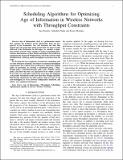Scheduling Algorithms for Optimizing Age of Information in Wireless Networks With Throughput Constraints
Author(s)
Kadota, Igor; Modiano, Eytan H
DownloadAccepted version (498.9Kb)
Terms of use
Metadata
Show full item recordAbstract
Age of Information AoI is a performance metric that captures the freshness of the information from the perspective of the destination. The AoI measures the time that elapsed since the generation of the packet that was most recently delivered to the destination. In this paper, we consider a single-hop wireless network with a number of nodes transmitting time-sensitive information to a base station and address the problem of minimizing the expected weighted sum AoI of the network while simultaneously satisfying timely-throughput constraints from the nodes. We develop four low-complexity transmission scheduling policies that attempt to minimize AoI subject to minimum throughput requirements and evaluate their performance against the optimal policy. In particular, we develop a randomized policy, a Max-Weight policy, a Drift-Plus-Penalty policy, and a Whittle’s Index policy, and show that they are guaranteed to be within a factor of two, four, two, and eight, respectively, away from the minimum AoI possible. The simulation results show that Max-Weight and Drift-Plus-Penalty outperform the other policies, both in terms of AoI and throughput, in every network configuration simulated, and achieve near-optimal performance.
Date issued
2019-08Department
Massachusetts Institute of Technology. Laboratory for Information and Decision Systems; Massachusetts Institute of Technology. Department of Aeronautics and AstronauticsJournal
IEEE/ACM Transactions on Networking
Publisher
Institute of Electrical and Electronics Engineers (IEEE)
Citation
Kadota, Igor, Abhishek Sinha and Eytan Modiano. “Scheduling Algorithms for Optimizing Age of Information in Wireless Networks With Throughput Constraints.” IEEE/ACM Transactions on Networking, vol. 27, no. 4 © 2019 The Author(s)
Version: Author's final manuscript
ISSN
1063-6692